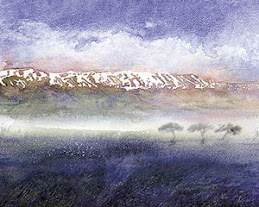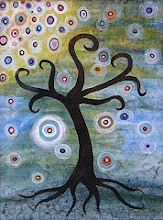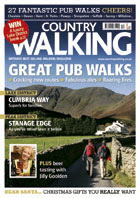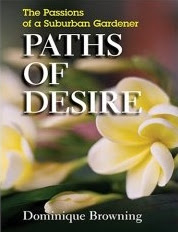Sitting in the twilight of my Jerusalem apartment of an evening, I had ample time to mull over the events of each day. If I were to find a narrative which explains the Palestinians situation, one people could read without switching off, that would have to be through storytelling. The first story I wrote, was Walid’s, the strong, swarthy, olive farmer from Hebron, with melting brown eyes, and the biggest black moustache I had ever seen. On the balcony early one morning, listening to the distant sing song of the Muezzin as hickory wood smoke swirled above the tangled roofs of Beit Jala, down in the valley, I began writing. From that one story, others flowed.
If online diaries were the norm then, I would have relished being a daily writer. Instead, I wrote long newsy letters to family and friends. Those were often written at weekends, while having breakfast at the Osteria Papas in Moshe Salomon Street in West Jerusalem, or when having lunch in the courtyard of the American Colony Hotel in East Jerusalem. In my first year there I split my recreation between Palestinian and Israeli areas. I never once raised the Palestinians situation with any Israelis. I had no way of knowing, if the person I was conversing with could be a member of the Shin Bet (security police). Thereafter, I mostly confined myself to Palestinian areas where I was emotionally more comfortable. My Palestinian friends and students became family.
How does one describe a military occupation? Oppressive, powerful, terrifying, controlling and sanctioning - are relevant words. The control affects most aspects of people’s daily living activities. There is no autonomy, no democracy, no self-determination, for an occupied people. The rules are laid down by the occupiers and the occupied must obey or perish. The burden of this situation for Palestinians and Israelis has essential differences and some similarities. The main similarity being, neither side is achieving any tangible long term security. The two communities are locked in a dehumanising, spiralling degradation, which appears to have no end.
Tomes have been written about this 60 year conflict. What we often do not hear are the dissenting voices in Israel, or those of the Jews in other countries speaking out against the oppressive measures of the Israeli State. Those people often silenced by accusations of anti-semitism, anti-Zionism and disloyalty, are gaining a momentum. Some dissenters believe Israel has become an out of control renegade state. Others wearied by the constant militarism and the settler intransigence, are taking a firmer human rights stand in support of a just peace.
“Legitimate self-defence does not mean oppressing a whole community or people. It does not mean demolishing their houses. Nor does it mean uprooting their olive trees, something that is specifically forbidden in the Torah (Dueteronomy20:19-20). It does not mean preventing them and their children from getting to hospitals or subjecting them to humiliation” (Mongtague, 2008).
Sara Roy’s most recent book, published in 2007, presents a collection of her research in the Gaza Strip over 20 years. Roy, a Harvard academic, the daughter of holocaust survivors, first went to Gaza in the summer of 1985 to conduct fieldwork for her doctoral dissertation. Her research focused on whether it was possible to promote economic development under the conditions of a military occupation.
Roy states that summer in Gaza changed her life. "I learned how occupation works, its impact on the economy, on daily life, and its grinding impact on the people, what it means to have little control over one’s life and, more importantly, over the lives of one’s children." Her shock when first going into Gaza, has parallels with my first reaction. It seemed inconceivable, that people should have to live in such appalling conditions.
A feature of life in Gaza has always been the constant closures by the Israeli military which cuts off trade, preventing produce such as fruit and vegetables grown in Gaza from access to markets, and workers from access to their jobs in Israel. Closures also prevent essential supplies of all kinds, including food and medicines, from going into Gaza. Try to imagine a month when the town or city you live in is completely cut off. How long do you think would it take before basic needs cease to be met? It is difficult to imagine, unless you think of hurricane examples such as, Katrina and New Orleans.
Imagine having to go through military checkpoints in your country, with no guarantee from day to day that the soldiers will let you pass. Then there is the wall which cuts off farmers from their olive trees, isolates villages and towns, making travel if a permit is given, even more torturous in the West Bank.
 One has to question if illegal walls such as this one, erected around Bethlehem in 2005, is more representative of state belligerence against peace, as opposed to being a protection barrier against suicide bombers. And why has the constant building of illegal Israeli settlements become the norm in Palestinian land since1967, if peace is truly desired by the Israeli State?
One has to question if illegal walls such as this one, erected around Bethlehem in 2005, is more representative of state belligerence against peace, as opposed to being a protection barrier against suicide bombers. And why has the constant building of illegal Israeli settlements become the norm in Palestinian land since1967, if peace is truly desired by the Israeli State?
Avraham Burg (2008) author of The Holocaust Is Over We Must Rise From Its Ashes, published the article The End of Zionism Israel must shed its illusions and choose between racist oppression and democracy, in 2003. Burg, a former speaker of the Knesset became a political dissenter. "It turns out that the 2000-year struggle for Jewish survival comes down to a state of settlements, run by an amoral clique of corrupt lawbreakers who are deaf both to their citizens and to their enemies. A state lacking justice cannot survive."
Burg's anxiety for the future of Israel, is replicated by other Jewish dissenters, academics, and people from all walks of life in Jewish communities. Dissention is presently a hopeful, more than a strong enough presence for peace. The powerful Jewish lobby in America, vigorously, sometimes visciously, oppose dissenters. That resonates with totalitarianism. Free speech can only be free, if people tow the party line. Some like Burg, believe the soul of Judaism, which embeds Jewish identity, is being eroded by state policies against the Palestinian people.
If online diaries were the norm then, I would have relished being a daily writer. Instead, I wrote long newsy letters to family and friends. Those were often written at weekends, while having breakfast at the Osteria Papas in Moshe Salomon Street in West Jerusalem, or when having lunch in the courtyard of the American Colony Hotel in East Jerusalem. In my first year there I split my recreation between Palestinian and Israeli areas. I never once raised the Palestinians situation with any Israelis. I had no way of knowing, if the person I was conversing with could be a member of the Shin Bet (security police). Thereafter, I mostly confined myself to Palestinian areas where I was emotionally more comfortable. My Palestinian friends and students became family.
How does one describe a military occupation? Oppressive, powerful, terrifying, controlling and sanctioning - are relevant words. The control affects most aspects of people’s daily living activities. There is no autonomy, no democracy, no self-determination, for an occupied people. The rules are laid down by the occupiers and the occupied must obey or perish. The burden of this situation for Palestinians and Israelis has essential differences and some similarities. The main similarity being, neither side is achieving any tangible long term security. The two communities are locked in a dehumanising, spiralling degradation, which appears to have no end.
Tomes have been written about this 60 year conflict. What we often do not hear are the dissenting voices in Israel, or those of the Jews in other countries speaking out against the oppressive measures of the Israeli State. Those people often silenced by accusations of anti-semitism, anti-Zionism and disloyalty, are gaining a momentum. Some dissenters believe Israel has become an out of control renegade state. Others wearied by the constant militarism and the settler intransigence, are taking a firmer human rights stand in support of a just peace.
“Legitimate self-defence does not mean oppressing a whole community or people. It does not mean demolishing their houses. Nor does it mean uprooting their olive trees, something that is specifically forbidden in the Torah (Dueteronomy20:19-20). It does not mean preventing them and their children from getting to hospitals or subjecting them to humiliation” (Mongtague, 2008).
Sara Roy’s most recent book, published in 2007, presents a collection of her research in the Gaza Strip over 20 years. Roy, a Harvard academic, the daughter of holocaust survivors, first went to Gaza in the summer of 1985 to conduct fieldwork for her doctoral dissertation. Her research focused on whether it was possible to promote economic development under the conditions of a military occupation.
Roy states that summer in Gaza changed her life. "I learned how occupation works, its impact on the economy, on daily life, and its grinding impact on the people, what it means to have little control over one’s life and, more importantly, over the lives of one’s children." Her shock when first going into Gaza, has parallels with my first reaction. It seemed inconceivable, that people should have to live in such appalling conditions.
A feature of life in Gaza has always been the constant closures by the Israeli military which cuts off trade, preventing produce such as fruit and vegetables grown in Gaza from access to markets, and workers from access to their jobs in Israel. Closures also prevent essential supplies of all kinds, including food and medicines, from going into Gaza. Try to imagine a month when the town or city you live in is completely cut off. How long do you think would it take before basic needs cease to be met? It is difficult to imagine, unless you think of hurricane examples such as, Katrina and New Orleans.
Imagine having to go through military checkpoints in your country, with no guarantee from day to day that the soldiers will let you pass. Then there is the wall which cuts off farmers from their olive trees, isolates villages and towns, making travel if a permit is given, even more torturous in the West Bank.
 One has to question if illegal walls such as this one, erected around Bethlehem in 2005, is more representative of state belligerence against peace, as opposed to being a protection barrier against suicide bombers. And why has the constant building of illegal Israeli settlements become the norm in Palestinian land since1967, if peace is truly desired by the Israeli State?
One has to question if illegal walls such as this one, erected around Bethlehem in 2005, is more representative of state belligerence against peace, as opposed to being a protection barrier against suicide bombers. And why has the constant building of illegal Israeli settlements become the norm in Palestinian land since1967, if peace is truly desired by the Israeli State? Avraham Burg (2008) author of The Holocaust Is Over We Must Rise From Its Ashes, published the article The End of Zionism Israel must shed its illusions and choose between racist oppression and democracy, in 2003. Burg, a former speaker of the Knesset became a political dissenter. "It turns out that the 2000-year struggle for Jewish survival comes down to a state of settlements, run by an amoral clique of corrupt lawbreakers who are deaf both to their citizens and to their enemies. A state lacking justice cannot survive."
Burg's anxiety for the future of Israel, is replicated by other Jewish dissenters, academics, and people from all walks of life in Jewish communities. Dissention is presently a hopeful, more than a strong enough presence for peace. The powerful Jewish lobby in America, vigorously, sometimes visciously, oppose dissenters. That resonates with totalitarianism. Free speech can only be free, if people tow the party line. Some like Burg, believe the soul of Judaism, which embeds Jewish identity, is being eroded by state policies against the Palestinian people.
References
Avraham Burg (2008) The Holcaust Is Over We Must Rise From The Ashes, New York, Palgrave McMillan.
Sara Roy (2007) Failing Peace: Gaza and the Palestinian Conflict, London & Ann Arbor MI, Pluto Press.
Jeremy Montague (2008)You Shall Not Follow a Multitude to Do Evil in Independent Jewish Voices on Israel, Zionism And Jewish Identity: A Time To Speak Out, London & New York, Verso Press.
Other Reading
Norman G. Finklestein (2005) Beyond Chutzpah On the Misuse of Anti-Semitism and the Abuse of History, London & New York, Verso Press.
Neturei Karta Jews Against Zionism.





